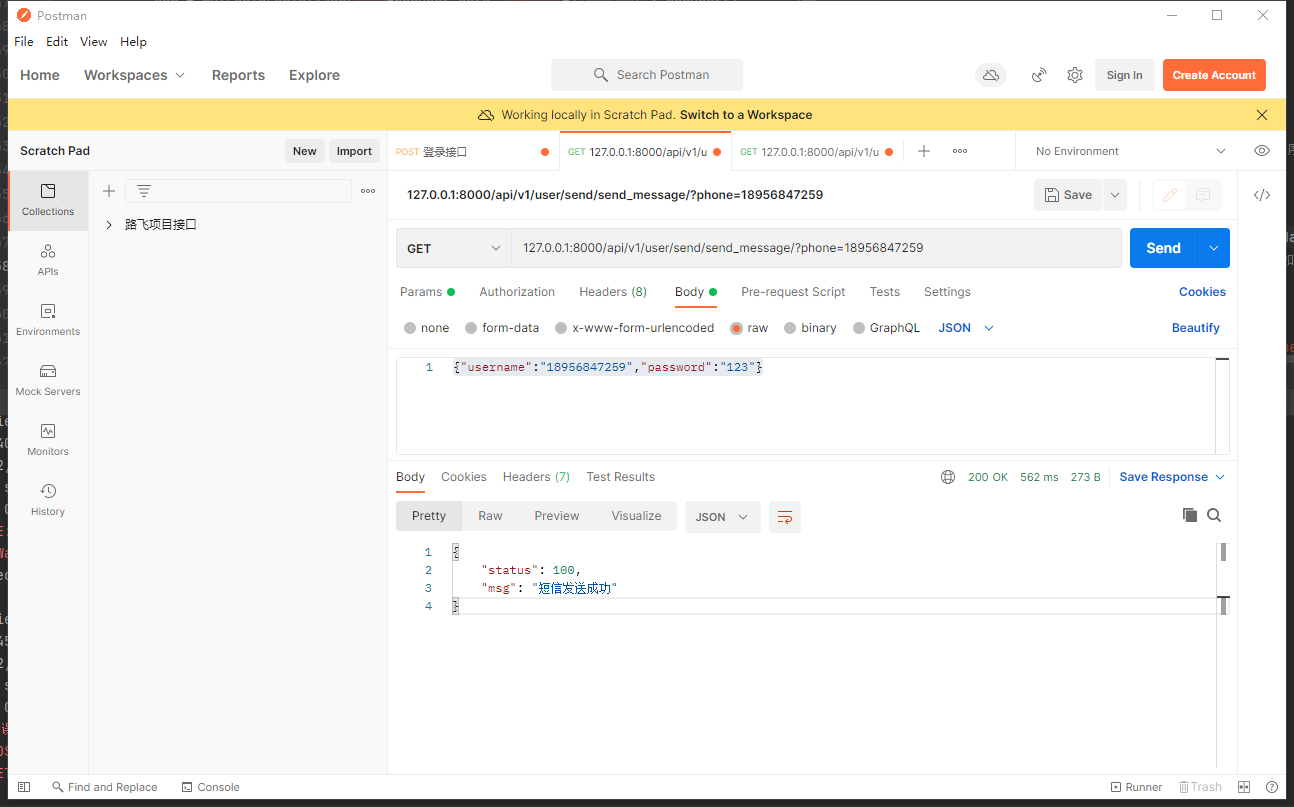文章目录
显示
? 优质资源分享 ?
| 学习路线指引(点击解锁) | 知识定位 | 人群定位 |
|---|---|---|
| ? Python实战微信订餐小程序 ? | 进阶级 | 本课程是python flask+微信小程序的完美结合,从项目搭建到腾讯云部署上线,打造一个全栈订餐系统。 |
| ?Python量化交易实战? | 入门级 | 手把手带你打造一个易扩展、更安全、效率更高的量化交易系统 |
今日内容概要
- 登陆注册页面
- 多方式登陆功能
- 腾讯云短信发送二次封装
- 发送短信接口
内容详细
1、登陆注册页面(前端项目页面)
# 打开前端项目 luffycity:
# 如果登录注册是一个新页面,比较好写
新建一个页面组件,跳转到这个页面即可
# 使用vue-router实现页面跳转
第一步:需要在router文件夹的index.js中配置一条路由
{
path: '/login',
name: 'login',
component: Login
}
第二步:访问/login路径,就会显示Login这个页面组件
第三步:点击按钮跳转到这个路径
js中:this.$router.push('/login')
第四步:在html页面中跳转-->点击该标签,就可以跳转到/login这个路径
"/login">
# 如果登录注册是单独一个页面的话比较简单
# 现在要求登录注册是弹出模态框效果--》弹出框---》也是组件
创建:Login,Register两个组件,普通组件---》放在components文件夹下
更改 src/router/index.js
import Vue from 'vue'
import VueRouter from 'vue-router'
import HomeView from '../views/HomeView.vue'
import Login from "@/components/Login"
Vue.use(VueRouter)
const routes = [
{
path: '/',
name: 'home',
component: HomeView
},
{
path: '/home',
name: 'home',
component: HomeView
},
{
path: '/login',
name: 'login',
component: Login
},
]
const router = new VueRouter({
mode: 'history',
base: process.env.BASE\_URL,
routes
})
export default router
更改 src/components/Header.vue :
老男孩IT教育 | 帮助有志向的年轻人通过努力学习获得体面的工作和生活
* 
* 免费课
* 实战课
* 轻课
登录
|
注册
import Login from "@/components/Login";
import Register from "@/components/Register";
export default {
name: "Header",
data() {
return {
url\_path: sessionStorage.url\_path || '/',
is\_login: false,
is\_register: false
}
},
methods: {
goPage(url\_path) {
// 已经是当前路由就没有必要重新跳转
if (this.url\_path !== url\_path) {
this.$router.push(url\_path);
}
sessionStorage.url\_path = url\_path;
},
close\_login() {
this.is\_login = false
},
close\_register() {
this.is\_register = false
},
put\_register() {
this.is\_register = true
this.is\_login = false
},
put\_login() {
this.is\_register = false
this.is\_login = true
}
},
created() {
sessionStorage.url\_path = this.$route.path;
this.url\_path = this.$route.path;
},
components: {
Login, Register
}
}
.header {
background-color: white;
box-shadow: 0 0 5px 0 #aaa;
}
.header:after {
content: "";
display: block;
clear: both;
}
.slogan {
background-color: #eee;
height: 40px;
}
.slogan p {
width: 1200px;
margin: 0 auto;
color: #aaa;
font-size: 13px;
line-height: 40px;
}
.nav {
background-color: white;
user-select: none;
width: 1200px;
margin: 0 auto;
}
.nav ul {
padding: 15px 0;
float: left;
}
.nav ul:after {
clear: both;
content: '';
display: block;
}
.nav ul li {
float: left;
}
.logo {
margin-right: 20px;
}
.ele {
margin: 0 20px;
}
.ele span {
display: block;
font: 15px/36px '微软雅黑';
border-bottom: 2px solid transparent;
cursor: pointer;
}
.ele span:hover {
border-bottom-color: orange;
}
.ele span.active {
color: orange;
border-bottom-color: orange;
}
.right-part {
float: right;
}
.right-part .line {
margin: 0 10px;
}
.right-part span {
line-height: 68px;
cursor: pointer;
}
更改 src/components/Banner.vue的template标签:
![]()
[![]()](https://blog.csdn.net/biggbang)
新建:src/components/Register.vue
新用户注册
{{ sms\_interval }}
注册
立即登录
export default {
name: "Register",
data() {
return {
mobile: '',
password: '',
sms: '',
sms\_interval: '获取验证码',
is\_send: false,
}
},
methods: {
close\_register() {
this.$emit('close', false)
},
go\_login() {
this.$emit('go')
},
check\_mobile() {
if (!this.mobile) return;
if (!this.mobile.match(/^1[3-9][0-9]{9}$/)) {
this.$message({
message: '手机号有误',
type: 'warning',
duration: 1000,
onClose: () => {
this.mobile = '';
}
});
return false;
}
this.is\_send = true;
},
send\_sms() {
if (!this.is\_send) return;
this.is\_send = false;
let sms\_interval\_time = 60;
this.sms\_interval = "发送中...";
let timer = setInterval(() => {
if (sms\_interval\_time <= 1) {
clearInterval(timer);
this.sms\_interval = "获取验证码";
this.is\_send = true; // 重新回复点击发送功能的条件
} else {
sms\_interval\_time -= 1;
this.sms\_interval = `${sms\_interval\_time}秒后再发`;
}
}, 1000);
}
}
}
.register {
width: 100vw;
height: 100vh;
position: fixed;
top: 0;
left: 0;
z-index: 10;
background-color: rgba(0, 0, 0, 0.3);
}
.box {
width: 400px;
height: 480px;
background-color: white;
border-radius: 10px;
position: relative;
top: calc(50vh - 240px);
left: calc(50vw - 200px);
}
.el-icon-close {
position: absolute;
font-weight: bold;
font-size: 20px;
top: 10px;
right: 10px;
cursor: pointer;
}
.el-icon-close:hover {
color: darkred;
}
.content {
position: absolute;
top: 40px;
width: 280px;
left: 60px;
}
.nav {
font-size: 20px;
height: 38px;
border-bottom: 2px solid darkgrey;
}
.nav > span {
margin-left: 90px;
color: darkgrey;
user-select: none;
cursor: pointer;
padding-bottom: 10px;
border-bottom: 2px solid darkgrey;
}
.nav > span.active {
color: black;
border-bottom: 3px solid black;
padding-bottom: 9px;
}
.el-input, .el-button {
margin-top: 40px;
}
.el-button {
width: 100%;
font-size: 18px;
}
.foot > span {
float: right;
margin-top: 20px;
color: orange;
cursor: pointer;
}
.sms {
color: orange;
cursor: pointer;
display: inline-block;
width: 70px;
text-align: center;
user-select: none;
}
新建:src/components/Login.vue
密码登录
短信登录
登录
{{ sms\_interval }}
登录
立即注册
export default {
name: "Login",
data() {
return {
username: '',
password: '',
mobile: '',
sms: '',
login\_method: 'is\_pwd',
sms\_interval: '获取验证码',
is\_send: false,
}
},
methods: {
close\_login() {
this.$emit('close')
},
go\_register() {
this.$emit('go')
},
change\_login\_method(method) {
this.login\_method = method;
},
check\_mobile() {
if (!this.mobile) return;
if (!this.mobile.match(/^1[3-9][0-9]{9}$/)) {
this.$message({
message: '手机号有误',
type: 'warning',
duration: 1000,
onClose: () => {
this.mobile = '';
}
});
return false;
}
this.is\_send = true;
},
send\_sms() {
if (!this.is\_send) return;
this.is\_send = false;
let sms\_interval\_time = 60;
this.sms\_interval = "发送中...";
let timer = setInterval(() => {
if (sms\_interval\_time <= 1) {
clearInterval(timer);
this.sms\_interval = "获取验证码";
this.is\_send = true; // 重新回复点击发送功能的条件
} else {
sms\_interval\_time -= 1;
this.sms\_interval = `${sms\_interval\_time}秒后再发`;
}
}, 1000);
}
}
}
.login {
width: 100vw;
height: 100vh;
position: fixed;
top: 0;
left: 0;
z-index: 10;
background-color: rgba(0, 0, 0, 0.3);
}
.box {
width: 400px;
height: 420px;
background-color: white;
border-radius: 10px;
position: relative;
top: calc(50vh - 210px);
left: calc(50vw - 200px);
}
.el-icon-close {
position: absolute;
font-weight: bold;
font-size: 20px;
top: 10px;
right: 10px;
cursor: pointer;
}
.el-icon-close:hover {
color: darkred;
}
.content {
position: absolute;
top: 40px;
width: 280px;
left: 60px;
}
.nav {
font-size: 20px;
height: 38px;
border-bottom: 2px solid darkgrey;
}
.nav > span {
margin: 0 20px 0 35px;
color: darkgrey;
user-select: none;
cursor: pointer;
padding-bottom: 10px;
border-bottom: 2px solid darkgrey;
}
.nav > span.active {
color: black;
border-bottom: 3px solid black;
padding-bottom: 9px;
}
.el-input, .el-button {
margin-top: 40px;
}
.el-button {
width: 100%;
font-size: 18px;
}
.foot > span {
float: right;
margin-top: 20px;
color: orange;
cursor: pointer;
}
.sms {
color: orange;
cursor: pointer;
display: inline-block;
width: 70px;
text-align: center;
user-select: none;
}
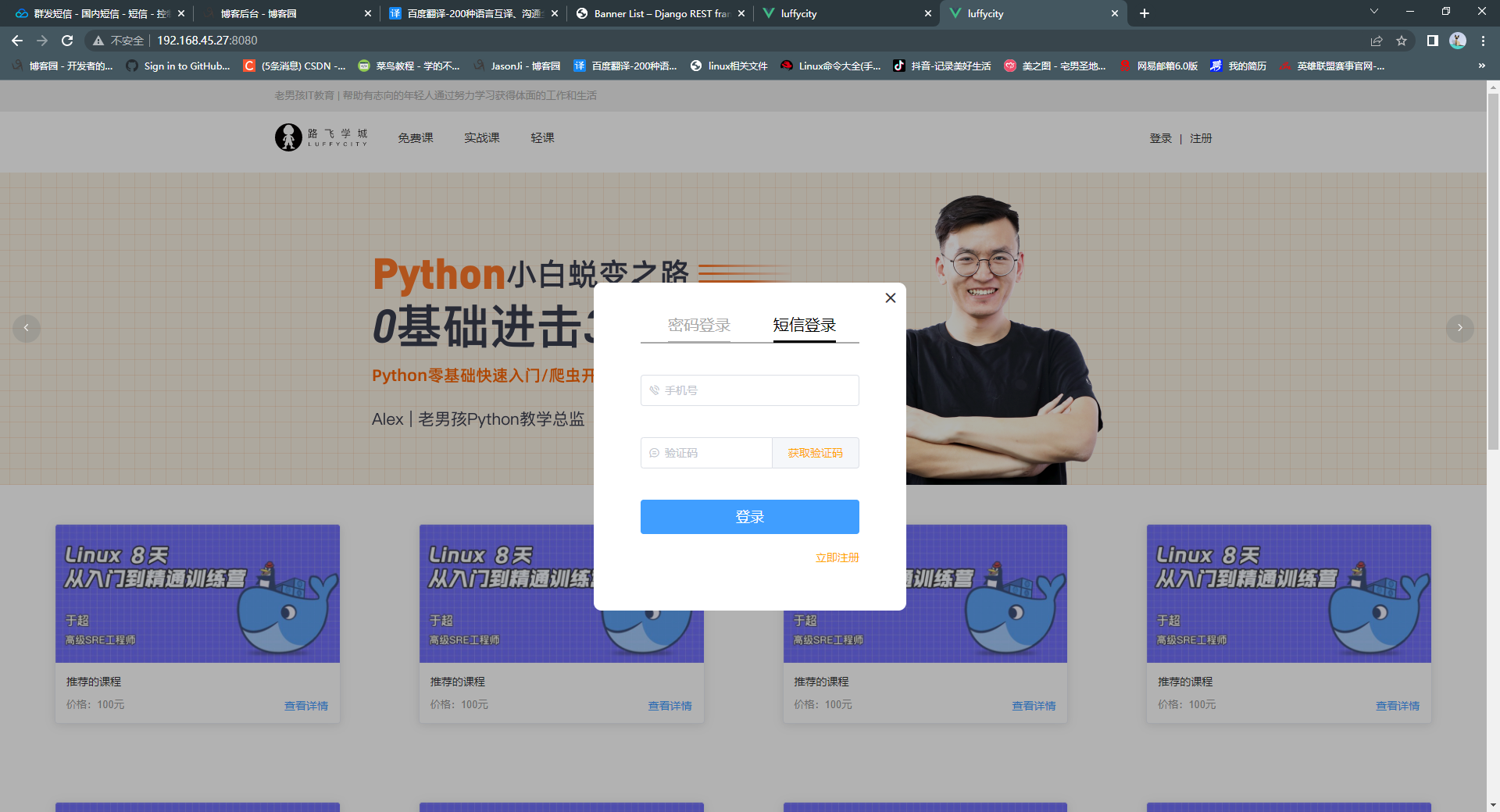
2、多方式登陆功能(后端项目接口)
# 打开后端 luffy\_api项目
# 输入用户名(手机号,邮箱),密码,都能登陆成功,签发token
# {username:lqz/1829348883775/3@qq.com,password:lqz123}--->到后端---》去数据库查用户,如果用户名密码正确,签发token,如果不正确,返回错误
pip install restframework-jwt
修改视图类 user/views.py:
from utils.common import add # pycharm提示红,但是没有错
from rest_framework.views import APIView
from rest_framework.response import Response
from utils.my_logging import logger
class TestView(APIView):
def get(self, requeste):
res = add(8, 9)
# 记录日志
logger.info("我执行了一下")
print(res)
return Response('ok')
from rest_framework.viewsets import ViewSet, GenericViewSet
from rest_framework.decorators import action
from .models import User
from rest_framework.exceptions import APIException
from utils.response import APIResponse
class MobileView(ViewSet):
# get 请求携带手机号,就能校验手机号
@action(methods=["GET"], detail=False)
def check\_mobile(self, request):
try:
mobile = request.query_params.get('mobile')
User.objects.get(mobile=mobile)
return APIResponse() # {code:100,msg:成功}-->前端判断,100就是手机号存在,非100,手机号步骤
except Exception as e:
raise APIException(str(e)) # 处理了全局异常,这里没问题
from .serializer import MulLoginSerializer
class LoginView(GenericViewSet):
serializer_class = MulLoginSerializer
queryset = User
# 两个登陆方式都写在这里面(多方式,一个是验证码登陆)
# login不是保存,但是用post,咱们的想法是把验证逻辑写到序列化类中
@action(methods=["post"], detail=False)
def mul\_login(self, request):
try:
ser = MulLoginSerializer(data=request.data, context={'request': request})
ser.is_valid(raise_exception=True) # 如果校验失败,直接抛异常,不需要加if判断了
token = ser.context.get('token')
username = ser.context.get('username')
icon = ser.context.get('icon')
return APIResponse(token=token, username=username, icon=icon) # {code:100,msg:成功,token:dsadsf,username:lqz}
except Exception as e:
raise APIException(str(e))
新建序列化类 user/serializer.py:
from .models import User
from rest_framework import serializers
from rest_framework.exceptions import ValidationError
# 这个序列化类,只用来做反序列化,数据校验,最后不保存,不用来做序列化
class MulLoginSerializer(serializers.ModelSerializer):
# 一定要重写username这个字段,因为username这个字段校验规则是从User表映射过来的,
# username是唯一,假设数据库中存在lqz这个用户,传入lqz,字段自己的校验规则就会校验失败,失败原因是数据库存在一个lqz用户了
# 所以需要重写这个字段,取消 掉它的unique
username = serializers.CharField(max_length=18, min_length=3) # 一定要重写,不重写,字段自己的校验过不去,就到不了全局钩子
class Meta:
model = User
fields = ['username', 'password']
def validate(self, attrs):
# 在这里面完成校验,如果校验失败,直接抛异常
# 1 多方式得到user
user = self._get_user(attrs)
# 2 user签发token
token = self._get_token(user)
# 3 把token,username,icon放到context中
self.context['token'] = token
self.context['username'] = user.username
# self.context['icon'] = 'http://127.0.0.1:8000/media/'+str(user.icon) # 对象ImageField的对象
# self.context['icon'] = 'http://127.0.0.1:8000/media/'+str(user.icon) # 对象ImageField的对象
request = self.context['request']
# request.META['HTTP\_HOST']取出服务端的ip地址
icon = 'http://%s/media/%s' % (request.META['HTTP\_HOST'], str(user.icon))
self.context['icon'] = icon
return attrs
# 意思是该方法只在类内部用,但是外部也可以用,如果写成\_\_就只能再内部用了
def \_get\_user(self, attrs):
import re
username = attrs.get('username')
if re.match(r'^1[3-9][0-9]{9}$', username):
user = User.objects.filter(mobile=username).first()
elif re.match(r'^.+@.+$', username):
user = User.objects.filter(email=username).first()
else:
user = User.objects.filter(username=username).first()
if not user:
# raise ValidationError('用户不存在')
raise ValidationError('用户名或密码错误')
# 取出前端传入的密码
password = attrs.get('password')
if not user.check_password(password): # 学auth时讲的,通过明文校验密码
raise ValidationError("用户名或密码错误")
return user
def \_get\_token(self, user):
# jwt模块中提供的
from rest_framework_jwt.serializers import jwt_payload_handler, jwt_encode_handler
payload = jwt_payload_handler(user)
token = jwt_encode_handler(payload)
return token
修改 user/urls.py:
from django.urls import path, include
from rest_framework.routers import SimpleRouter
from .views import MobileView, LoginView, SendSmsView
router = SimpleRouter()
# 127.0.0.1:8000/api/v1/user/mobile/check\_mobile
router.register('mobile', UserView, 'mobile')
# # 127.0.0.1:8000/api/v1/user/login/mul\_login--->post
router.register('login', LoginView, 'login')
urlpatterns = [
path('', include(router.urls)),
]
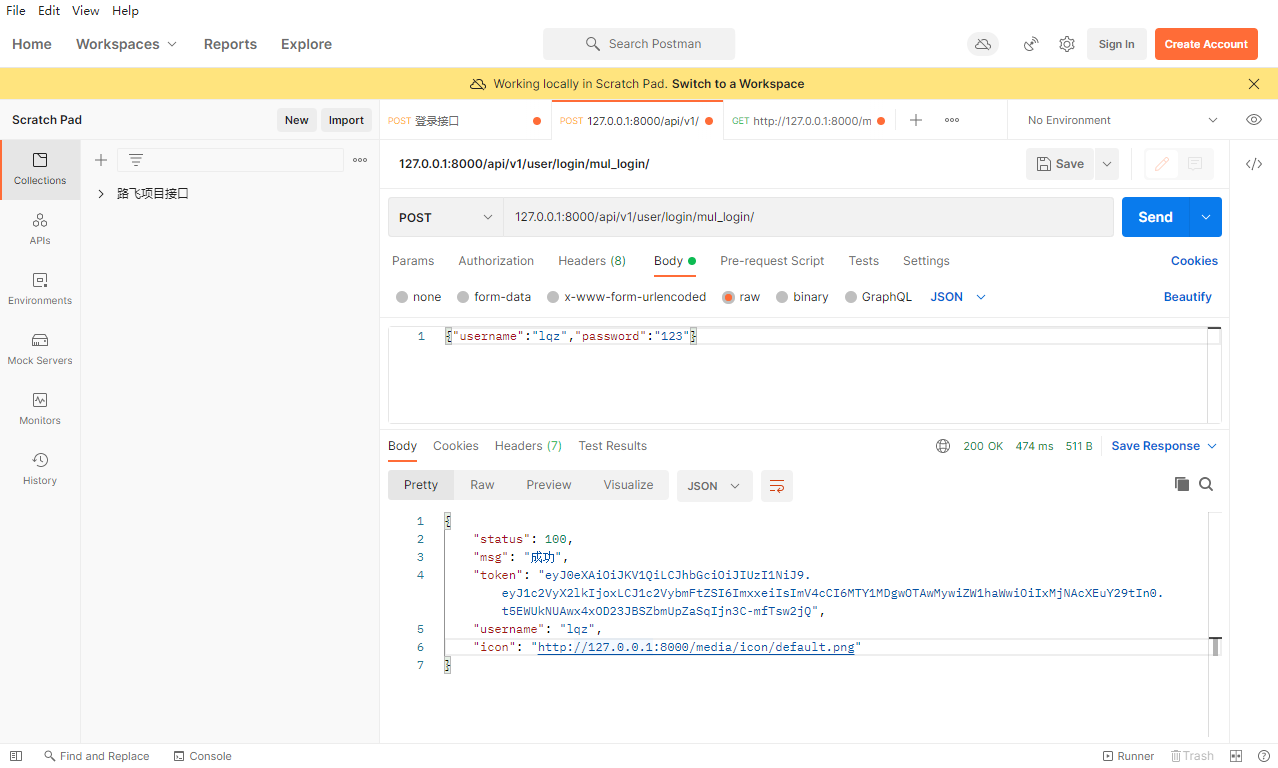
3、腾讯云短信发送二次封装
# 短信文档地址:
https://cloud.tencent.com/document/product/382/43196
# 安装sdk模块:
pip install tencentcloud-sdk-python
# 进入腾讯云创建密钥
# 单独文本测试短信能否正常接收
# 封装成包,以后,无论什么框架,只要把包copy过去,导入直接用即可
# 将 libs做成包 创建:
__init__.py
tencent_sms_v3 目录下继续创建:
__init__.py
settings.py
sms.py
在 libs/tencent_sms_v3/init.py中写:
from .sms import get_code, send_sms
在 libs/tencent_sms_v3/settings.py中写:
# 按照自己的腾讯云短信配置填写
SECRETID = 'AKIDWlmZ7RWLvFI5cv0pOhx1rTr0vhEVVGl1'
SECRETKEY = '3qNddNq30g6JH1WnrhJgpjPr67uUrztY'
APPID = "1400668779"
SIGNAME = '开源大牛公众号'
TemplateId = "1379611"
在在 libs/tencent_sms_v3/sms.py中写:
import random
from . import settings
from utils.my_logging import logger
from tencentcloud.common import credential
from tencentcloud.common.exception.tencent_cloud_sdk_exception import TencentCloudSDKException
# 导入对应产品模块的client models
from tencentcloud.sms.v20210111 import sms_client, models
# 导入可选配置类
from tencentcloud.common.profile.client_profile import ClientProfile
from tencentcloud.common.profile.http_profile import HttpProfile
# 写两个函数,
# 获取验证码的函数
def get\_code(count=4):
code_str = ''
for i in range(count):
num = random.randint(0, 9)
code_str += str(num)
return code_str
# 发送短信的函数
def send\_sms(phone, code):
try:
cred = credential.Credential(settings.SECRETID, settings.SECRETKEY)
# 实例化一个http选项,可选的,没有特殊需求可以跳过。
httpProfile = HttpProfile()
httpProfile.reqMethod = "POST" # post请求(默认为post请求)
httpProfile.reqTimeout = 30 # 请求超时时间,单位为秒(默认60秒)
httpProfile.endpoint = "sms.tencentcloudapi.com" # 指定接入地域域名(默认就近接入)
clientProfile = ClientProfile()
clientProfile.signMethod = "TC3-HMAC-SHA256" # 指定签名算法
clientProfile.language = "en-US"
clientProfile.httpProfile = httpProfile
client = sms_client.SmsClient(cred, "ap-guangzhou", clientProfile)
req = models.SendSmsRequest()
req.SmsSdkAppId = settings.APPID
req.SignName = settings.SIGNAME
req.TemplateId = settings.TemplateId
req.TemplateParamSet = [code, ]
req.PhoneNumberSet = ["+86%s" % phone, ]
req.SessionContext = ""
req.ExtendCode = ""
req.SenderId = ""
client.SendSms(req)
# print(resp.to\_json\_string(indent=2))
return True
except TencentCloudSDKException as err:
# 如果短信发送失败,记录一下日志--》一旦使用了记录日志,使用的是django 的日志,以后这个包,给别的框架用,要改日志
logger.error('手机号为:%s发送短信失败,失败原因:%s' % phone, str(err))
sdk发送短信v3版本:创建send_sms_v3.py:
# -*- coding: utf-8 -*-
from tencentcloud.common import credential
from tencentcloud.common.exception.tencent_cloud_sdk_exception import TencentCloudSDKException
# 导入对应产品模块的client models。
from tencentcloud.sms.v20210111 import sms_client, models
# 导入可选配置类
from tencentcloud.common.profile.client_profile import ClientProfile
from tencentcloud.common.profile.http_profile import HttpProfile
try:
# 必要步骤:
# 实例化一个认证对象,入参需要传入腾讯云账户密钥对secretId,secretKey。
# 这里采用的是从环境变量读取的方式,需要在环境变量中先设置这两个值。
# 你也可以直接在代码中写死密钥对,但是小心不要将代码复制、上传或者分享给他人,
# 以免泄露密钥对危及你的财产安全。
# SecretId、SecretKey 查询: https://console.cloud.tencent.com/cam/capi
cred = credential.Credential("AKIDWlmZ7RWLvFI5cv0pOhx1rTr0vhEVVGl1", "3qNddNq30g6JH1WnrhJgpjPr67uUrztY")
# cred = credential.Credential(
# os.environ.get(""),
# os.environ.get("")
# )
# 实例化一个http选项,可选的,没有特殊需求可以跳过。
httpProfile = HttpProfile()
# 如果需要指定proxy访问接口,可以按照如下方式初始化hp(无需要直接忽略)
# httpProfile = HttpProfile(proxy="http://用户名:密码@代理IP:代理端口")
httpProfile.reqMethod = "POST" # post请求(默认为post请求)
httpProfile.reqTimeout = 30 # 请求超时时间,单位为秒(默认60秒)
httpProfile.endpoint = "sms.tencentcloudapi.com" # 指定接入地域域名(默认就近接入)
# 非必要步骤:
# 实例化一个客户端配置对象,可以指定超时时间等配置
clientProfile = ClientProfile()
clientProfile.signMethod = "TC3-HMAC-SHA256" # 指定签名算法
clientProfile.language = "en-US"
clientProfile.httpProfile = httpProfile
# 实例化要请求产品(以sms为例)的client对象
# 第二个参数是地域信息,可以直接填写字符串ap-guangzhou,支持的地域列表参考 https://cloud.tencent.com/document/api/382/52071#.E5.9C.B0.E5.9F.9F.E5.88.97.E8.A1.A8
client = sms_client.SmsClient(cred, "ap-guangzhou", clientProfile)
# 实例化一个请求对象,根据调用的接口和实际情况,可以进一步设置请求参数
# 你可以直接查询SDK源码确定SendSmsRequest有哪些属性可以设置
# 属性可能是基本类型,也可能引用了另一个数据结构
# 推荐使用IDE进行开发,可以方便的跳转查阅各个接口和数据结构的文档说明
req = models.SendSmsRequest()
# 基本类型的设置:
# SDK采用的是指针风格指定参数,即使对于基本类型你也需要用指针来对参数赋值。
# SDK提供对基本类型的指针引用封装函数
# 帮助链接:
# 短信控制台: https://console.cloud.tencent.com/smsv2
# 腾讯云短信小助手: https://cloud.tencent.com/document/product/382/3773#.E6.8A.80.E6.9C.AF.E4.BA.A4.E6.B5.81
# 短信应用ID: 短信SdkAppId在 [短信控制台] 添加应用后生成的实际SdkAppId,示例如1400006666
# 应用 ID 可前往 [短信控制台](https://console.cloud.tencent.com/smsv2/app-manage) 查看
req.SmsSdkAppId = "1400668779"
# 短信签名内容: 使用 UTF-8 编码,必须填写已审核通过的签名
# 签名信息可前往 [国内短信](https://console.cloud.tencent.com/smsv2/csms-sign) 或 [国际/港澳台短信](https://console.cloud.tencent.com/smsv2/isms-sign) 的签名管理查看
req.SignName = "开源大牛公众号"
# 模板 ID: 必须填写已审核通过的模板 ID
# 模板 ID 可前往 [国内短信](https://console.cloud.tencent.com/smsv2/csms-template) 或 [国际/港澳台短信](https://console.cloud.tencent.com/smsv2/isms-template) 的正文模板管理查看
req.TemplateId = "1379611"
# 模板参数: 模板参数的个数需要与 TemplateId 对应模板的变量个数保持一致,,若无模板参数,则设置为空
req.TemplateParamSet = ["8888"]
# 下发手机号码,采用 E.164 标准,+[国家或地区码][手机号]
# 示例如:+8613711112222, 其中前面有一个+号 ,86为国家码,13711112222为手机号,最多不要超过200个手机号
req.PhoneNumberSet = ["+8618956847259"]
# 用户的 session 内容(无需要可忽略): 可以携带用户侧 ID 等上下文信息,server 会原样返回
req.SessionContext = ""
# 短信码号扩展号(无需要可忽略): 默认未开通,如需开通请联系 [腾讯云短信小助手]
req.ExtendCode = ""
# 国际/港澳台短信 senderid(无需要可忽略): 国内短信填空,默认未开通,如需开通请联系 [腾讯云短信小助手]
req.SenderId = ""
resp = client.SendSms(req)
# 输出json格式的字符串回包
print(resp.to_json_string(indent=2))
# 当出现以下错误码时,快速解决方案参考
# - [FailedOperation.SignatureIncorrectOrUnapproved](https://cloud.tencent.com/document/product/382/9558#.E7.9F.AD.E4.BF.A1.E5.8F.91.E9.80.81.E6.8F.90.E7.A4.BA.EF.BC.9Afailedoperation.signatureincorrectorunapproved-.E5.A6.82.E4.BD.95.E5.A4.84.E7.90.86.EF.BC.9F)
# - [FailedOperation.TemplateIncorrectOrUnapproved](https://cloud.tencent.com/document/product/382/9558#.E7.9F.AD.E4.BF.A1.E5.8F.91.E9.80.81.E6.8F.90.E7.A4.BA.EF.BC.9Afailedoperation.templateincorrectorunapproved-.E5.A6.82.E4.BD.95.E5.A4.84.E7.90.86.EF.BC.9F)
# - [UnauthorizedOperation.SmsSdkAppIdVerifyFail](https://cloud.tencent.com/document/product/382/9558#.E7.9F.AD.E4.BF.A1.E5.8F.91.E9.80.81.E6.8F.90.E7.A4.BA.EF.BC.9Aunauthorizedoperation.smssdkappidverifyfail-.E5.A6.82.E4.BD.95.E5.A4.84.E7.90.86.EF.BC.9F)
# - [UnsupportedOperation.ContainDomesticAndInternationalPhoneNumber](https://cloud.tencent.com/document/product/382/9558#.E7.9F.AD.E4.BF.A1.E5.8F.91.E9.80.81.E6.8F.90.E7.A4.BA.EF.BC.9Aunsupportedoperation.containdomesticandinternationalphonenumber-.E5.A6.82.E4.BD.95.E5.A4.84.E7.90.86.EF.BC.9F)
# - 更多错误,可咨询[腾讯云助手](https://tccc.qcloud.com/web/im/index.html#/chat?webAppId=8fa15978f85cb41f7e2ea36920cb3ae1&title=Sms)
except TencentCloudSDKException as err:
print(err)
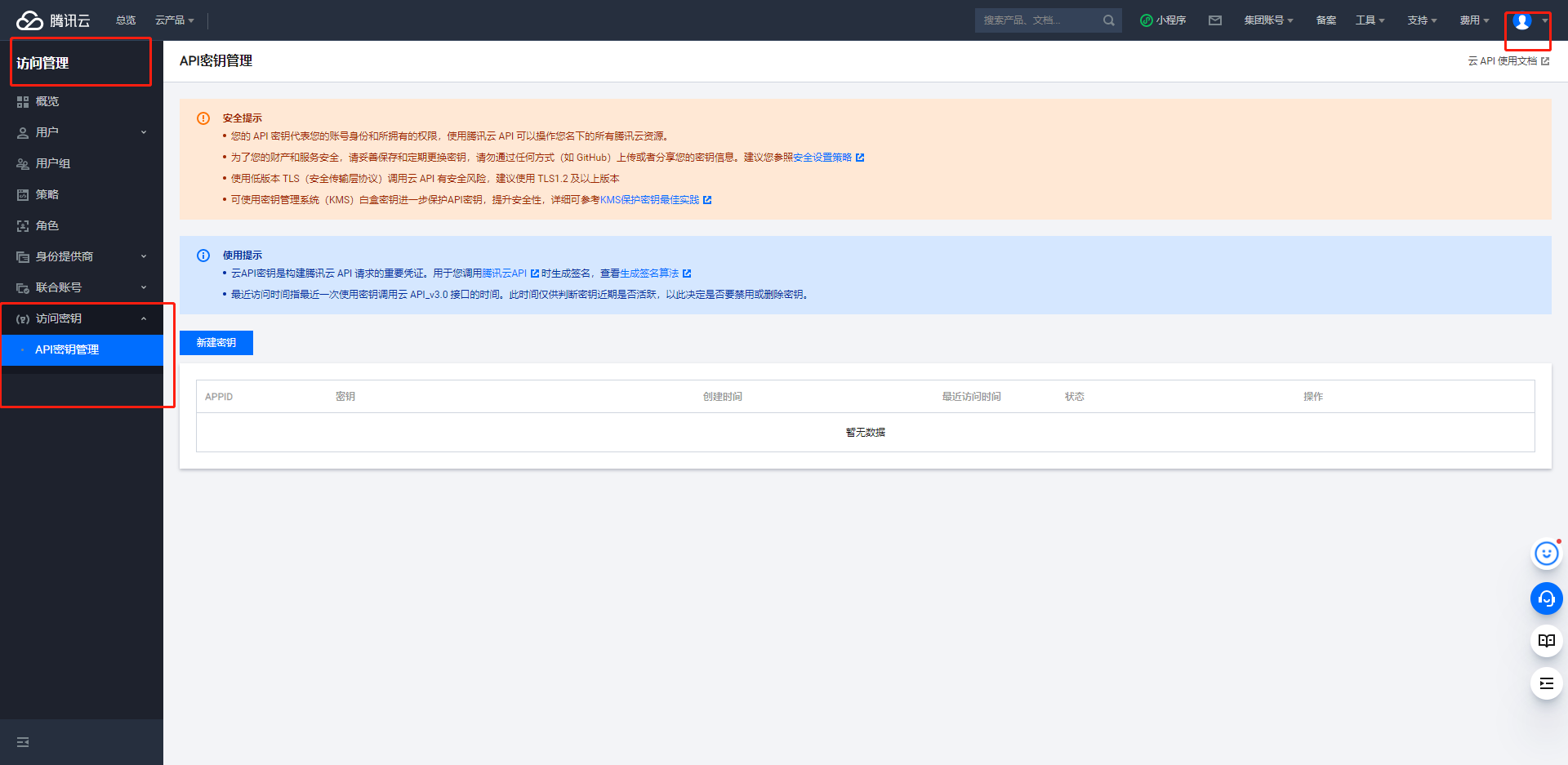

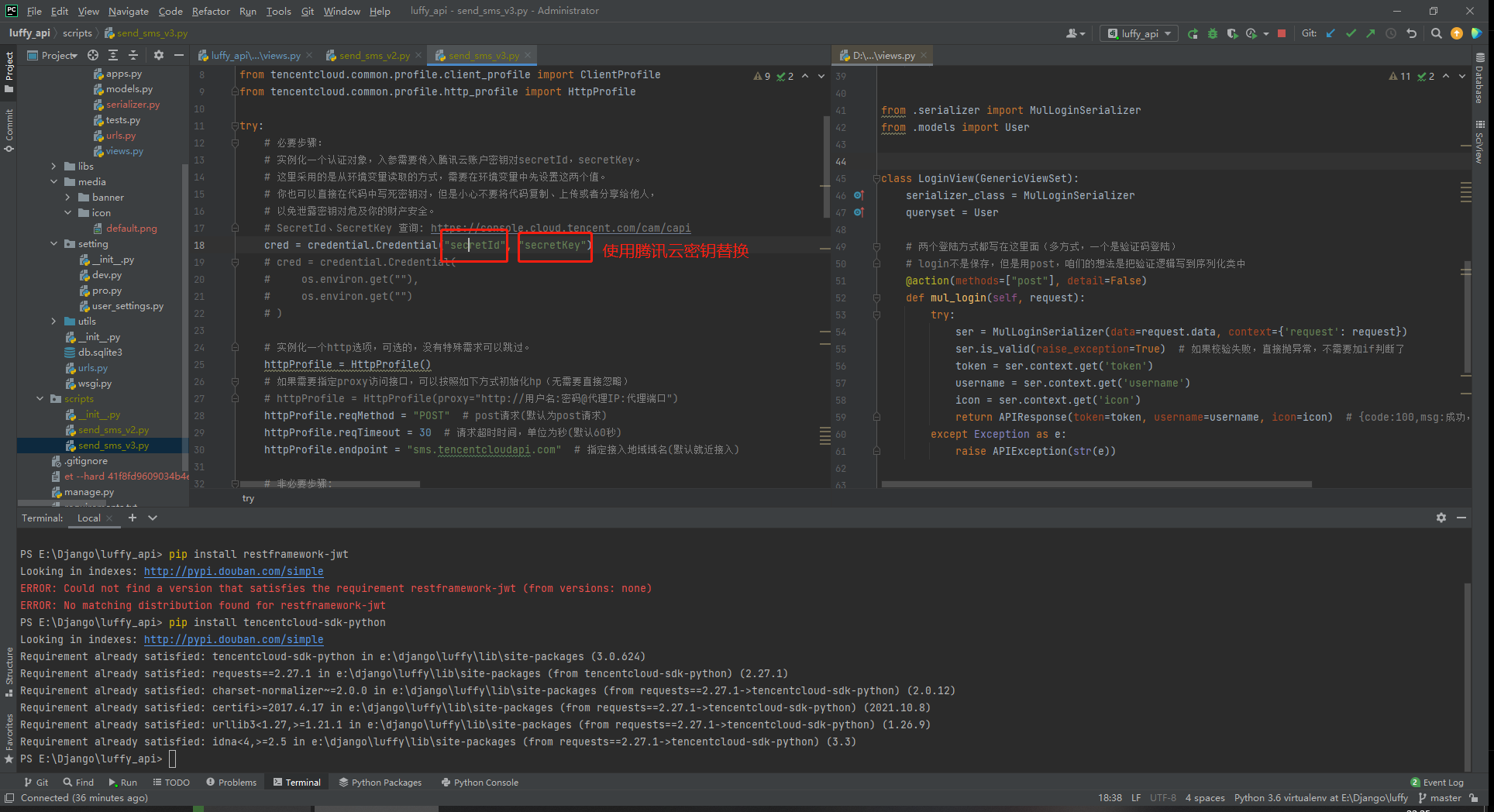
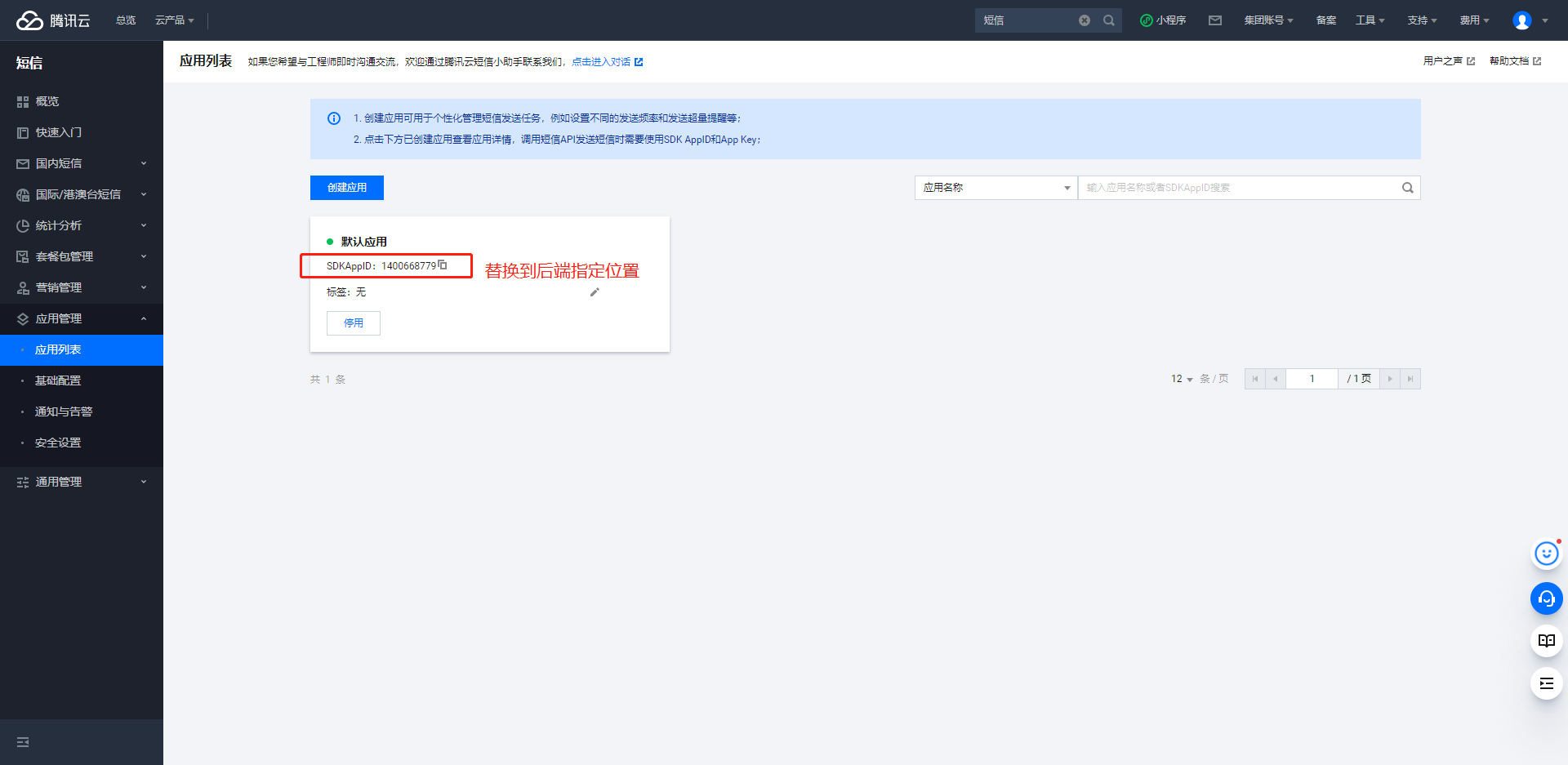
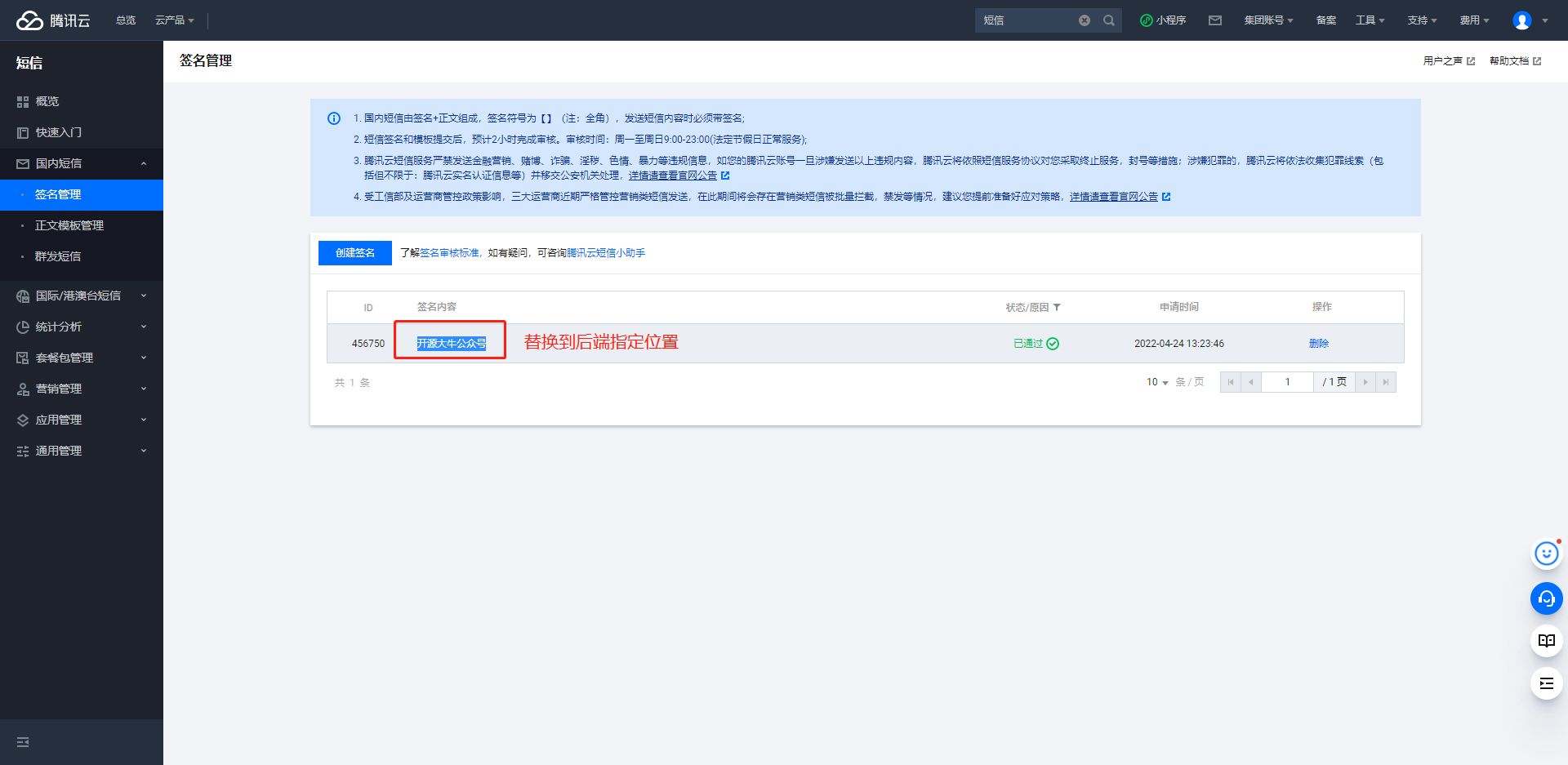
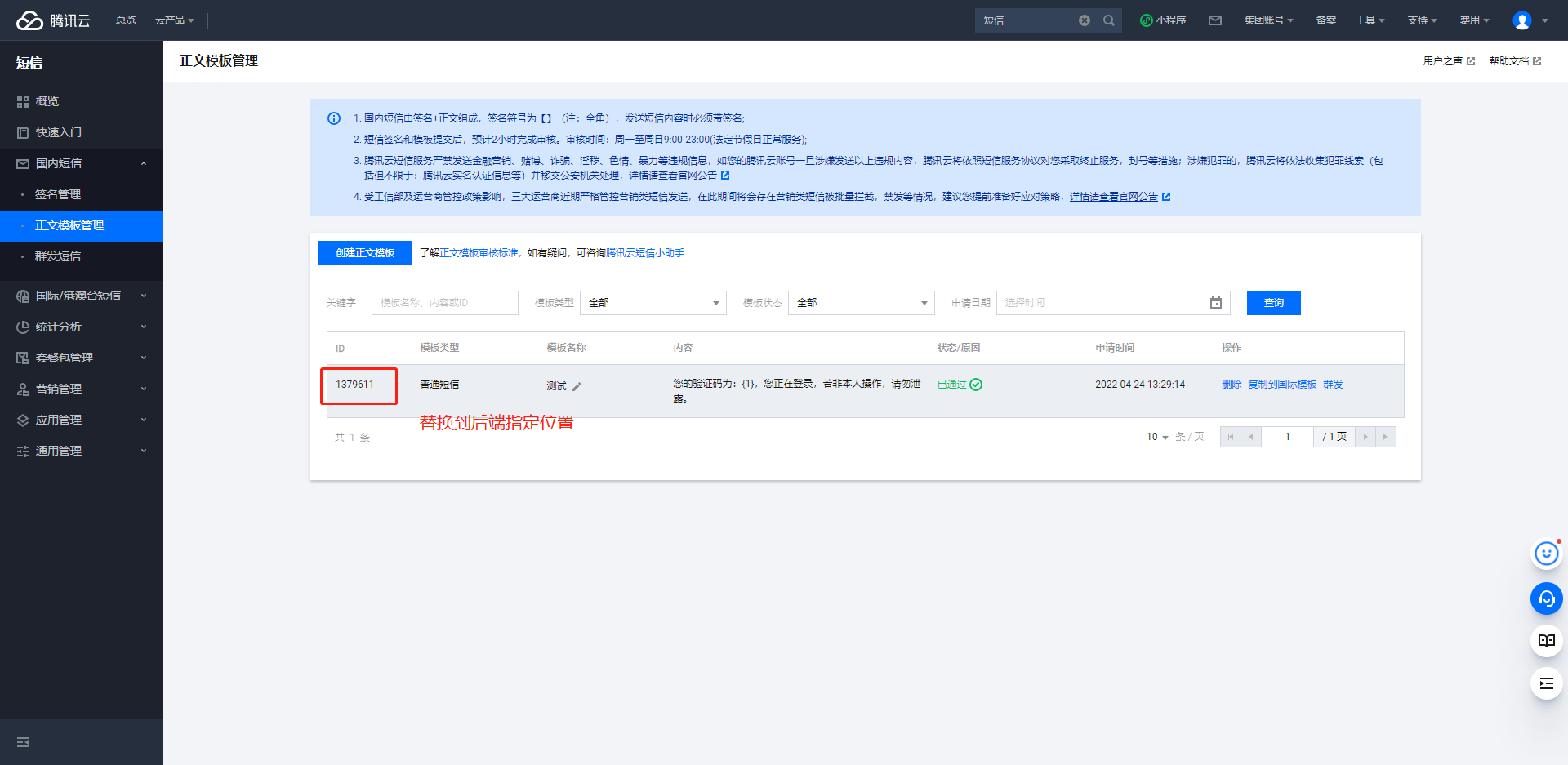
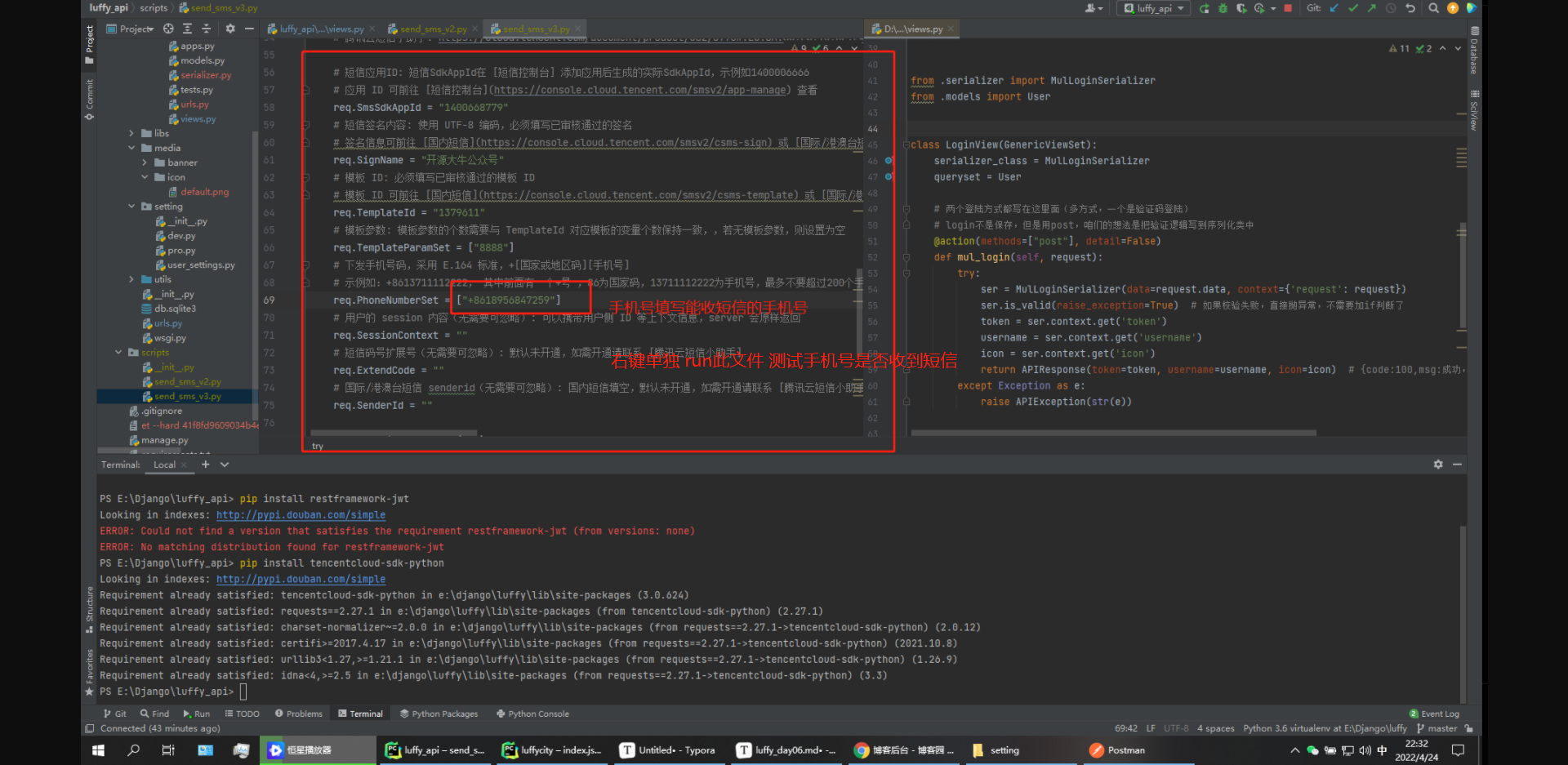
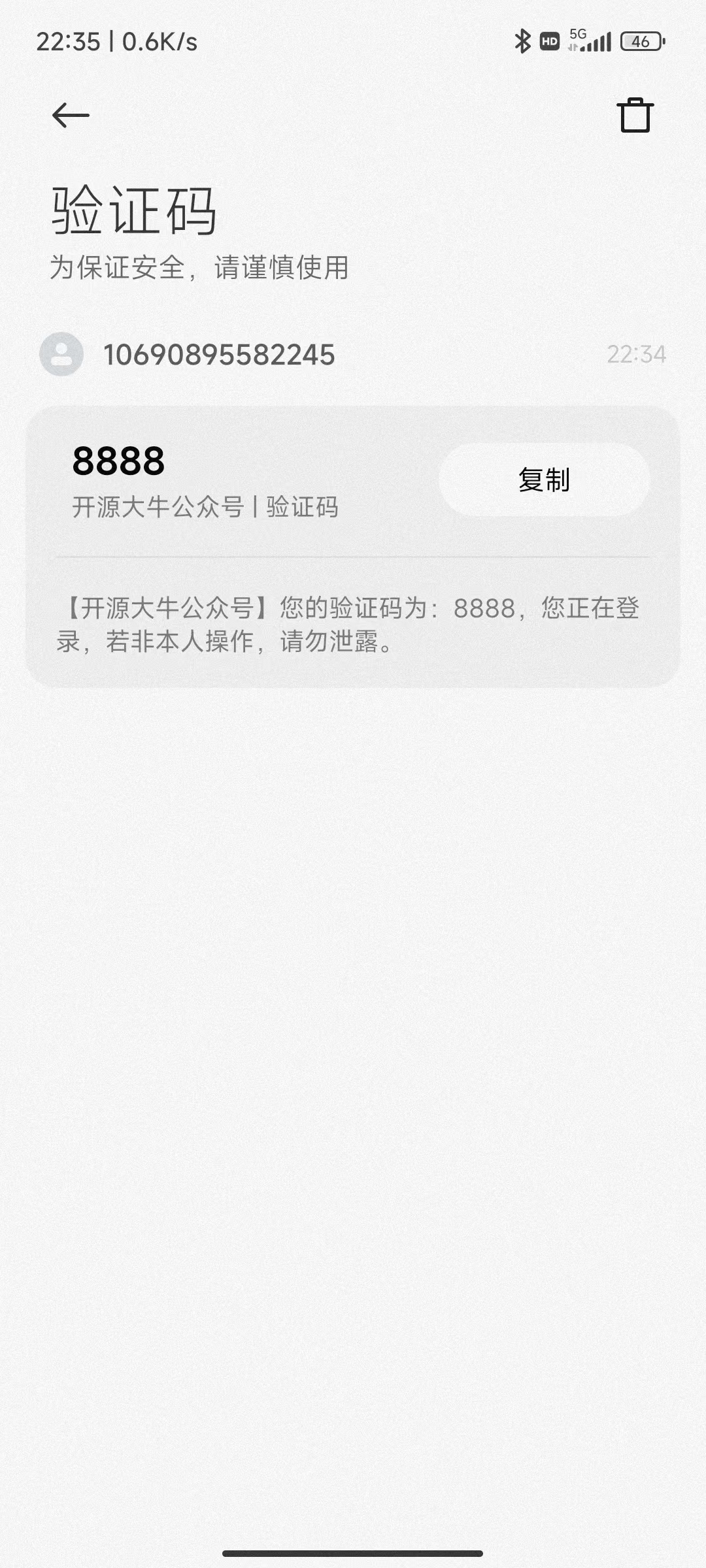
4、发送短信接口
# 效果:
get 携带手机号,就发送短信 ---》?phone=1828939944
添加路由 user/urls.py:
# 127.0.0.1:8000/api/v1/user/send/send\_message/--->get
router.register('send', SendSmsView, 'send')
视图类添加 user/views.py::
from libs import tencent_sms_v3
class SendSmsView(ViewSet):
@action(methods=['GET'], detail=False)
def send\_message(self, request):
try:
phone = request.query_params.get('phone')
# 生成验证码
code = tencent_sms_v3.get_code()
# code要保存,否则后面没法验证
res = tencent_sms_v3.send_sms(phone, code)
if res:
return APIResponse(msg='短信发送成功')
else:
raise APIException("短信发送失败")
except Exception as e:
raise APIException(str(e))
